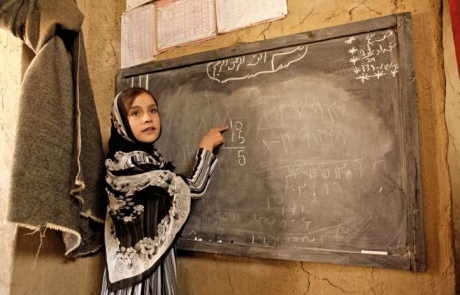By: Tyler LePard, Catapult

Photo via Women for Afghan Women
This year, 14 million girls – some as young as eight years old – will be married against their will, often to men decades older than themselves. Some girls are so young that they hold on to their toys during the wedding ceremony. The recent death of an eight year old Yemeni girl on her wedding night from internal bleeding, after a forced marriage to a man five times her age has caused a global outcry and re-energized commitment to ending this horrific human rights abuse.
You might think that child marriage is something that only happens in developing countries (if you even think of it at all). But child marriage is a genuinely global problem. In the UK, girls from diaspora communities find themselves tricked into the nightmare of forced marriage when they visit their home country for summer holiday. Here in the U.S., girls also suffer from the same abuse of forced marriage as girls in India, Nicaragua, and Ethiopia.
At Catapult, we’re proud to support Women for Afghan Women, one of the excellent organizations defending girls from child marriage in Afghanistan and Pakistan as well as here in our hometown, New York.
Our friends at Women for Afghan Women recently introduced us to Naila, a young women willing to shared her story of growing up in the United States, who found herself engaged at eight years old, and then forced into marriage as a teenager. It’s a complex story that shines a light on this deeply entrenched practice and the powerful roles that family and tradition play in perpetuating this violation of girls’ human rights.
An American Girl – Naila’s StoryNaila, now 24, moved from Pakistan to the United States with her family when she was 4 years old. Her family was very traditional and her father was strict. Naila’s older siblings both had arranged marriages, but Naila thought things would be different for her. “I wanted more than just to be married off to a cousin.”
When she was 8 years old, her family went back to Pakistan for a visit. During that trip, her father’s brother claimed Naila for his 21-year-old son (Naila’s cousin) and told her they were engaged. At that age, she didn’t understand what being engaged meant and didn’t think too much of it as she returned home.
When Naila was 13, she returned to Pakistan with her family for her brother’s wedding. During this trip, her family held a “Nikah” (religious wedding ceremony) and took pictures of Naila and her cousin together as bride and groom for immigration purposes (so that later Naila would later be able to bring her husband to the United States). Naila was upset and didn’t want to be married, but she was able to return to New York with her family.
To most people, Naila seemed like a typical American teenager. She started high school and met a boy that she liked. But when her father found out about their relationship, he beat her. Child Protective Services (CPS) took Naila away from her parents. She ran away from foster care and back to her parents, who hid her at their house. The cops were looking for her, so her parents told Naila they would take her to Pakistan until she was 18 in order to keep her away from the authorities.
The Darkest Days of My LifeThinking that she was just hiding from U.S. authorities, Naila went to Pakistan. However, a few months after arriving there, she and her cousin were married in an official wedding ceremony and Naila went to live with her husband. She was 15 years old, while he was 28. Her family returned to the United States without her. Naila’s husband took her passport. She describes this time period as the darkest days of her life.
“As a bride, you’re supposed to be happy… I come from a [well-off] family, so I had everything. [My husband] built me a brand new house and I had a pink bed because I loved pink so much. I had everything, but material things don’t mean anything.”
Ten days after her wedding, with her hands still covered in henna and wearing the red clothes and white shawl of a bride, Naila dared another escape. She told her husband that she was going to her mother-in-law’s house, but instead ran away through back streets and convinced a stranger to sell her shawl to Naila so she could try to blend in. She made it to the nearby city of Islamabad. However, once she was there she realized that though she had plenty of money, she couldn’t get a hotel room because she didn’t have a Pakistani ID and, as a young woman by herself, she attracted unwanted attention. “All around me were a bunch of men just looking at me. I was scared.”
Naila didn’t know where to turn. She didn’t know where the U.S. Embassy was and she was afraid that if she got in a taxi, she might be kidnapped. She called her mother’s cousin (who was like an uncle to her) to ask for help because he knew that she had not wanted to get married. He picked her up and convinced her to return to her husband, saying that everything would be ok. Not knowing what else to do, Naila reluctantly agreed, but told her uncle that if anything happened to her, he should call Child Protective Services in the United States and tell them that she was being held against her will in Pakistan.
When Naila got back to her village, her husband accused her uncle of eloping with Naila. This helped Naila’s case because it made her uncle so mad that he called CPS and told them that the truth about where Naila was.
Meanwhile, Naila’s husband beat her publicly, dragged her by her hair around his house, raped her, and told her he owned her. “He took a chunk out of my soul that night.”
The physical and mental abuse broke her down emotionally to the point where Naila wanted to kill him, but knew she couldn’t. Next she turned to thoughts of killing herself, and tried to drink bleach, but she couldn’t do that either. She started acting sick so that her husband wouldn’t touch her.
A month later, a U.S. embassy representative visited their house, where she managed to tell Naila that the representative couldn’t help her unless Naila ran away to the U.S. Embassy. In front of Naila’s husband, the representative acted like she was just there to make sure Naila was legitimately married, so that he wouldn’t get suspicious. She told Naila everything would be ok, but when she left, Naila’s heart broke. Naila hoped that the wheels were turning that would rescue her, but started to give up hope.
A month after that, Naila’s dad called to tell her that Naila’s mom had been arrested because Naila was still missing. He insisted that Naila had to come home in order for her mother to be released. Naila’s husband put her on a plane back to the United States a few days later.
As the plane landed, the other passengers were told to stay seated until Naila got off the plane. Police and Child Protective Services met her as she left the plane and took her to a psychiatric center (a locked facility, where her parents couldn’t get to her) where she received medical care and a rape kit. The next day the family court judge put Naila in a “residential treatment facility” that held 60 girls.
The Nightmare Was OverIt took two or three years before Naila stopped having nightmares of running away from her husband. Naila was diagnosed with posttraumatic stress disorder (PTSD) and anxiety. She managed to work out her relationship with her parents, but still has troubled relationships with men. She’s in college to be a social worker and dreams of opening a group home for girls that want to speak out against arranged marriages but don’t feel like they have anywhere to go.
“I will never be the same child that I was. I was robbed of my youth. A part of me was taken and I can never get it back. I’m broken inside, but I’m going to get better. I find help when I’m helping others heal.”
Naila knows that because of everything she went through, the young girls in her family, like her little sister and niece won’t have to get married and go through what she experienced. She feels like she went through her nightmare for a reason: so she can help others. That’s why Naila shares her story and why she volunteers with Women for Afghan Women. “I refuse to be a victim. I’m a survivor.”
Most people don’t realize that child marriage is happening right now, in every area of the world. You can help change this by supporting organizations like Women for Afghan Women and other partners who are working to end child marriage. Take action to make girls’ and women’s rights more than just a cover story.
Originally published at Women Deliver.








